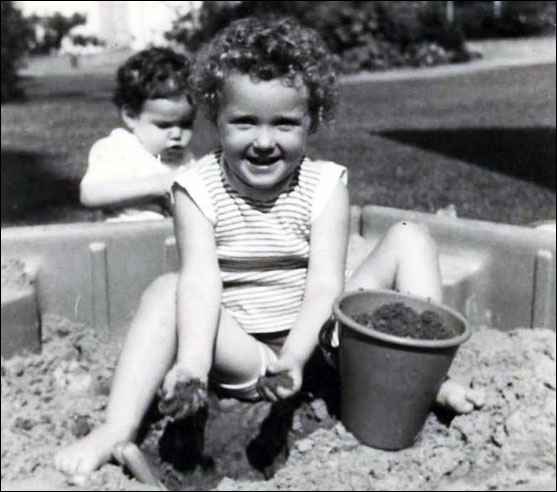
Fellowship days
I remember the truth and the love and the social justice, but also the cartwheels and the donuts.
But here’s a snapshot that comes to mind: Fueled by grocery store donuts in cardboard and cellophane boxes, powdered sugar all over the place, I learned to do cartwheels during coffee hour. People everywhere, people who cared about me. I was in kindergarten, and our Unitarian Fellowship was in its first year. That’s the image I have in my mind’s eye when I think about my start in Unitarian Universalism: Cartwheels. Donuts. Caring people everywhere.
When my parents and a few others first started the fellowship, my dad recruited some of us kids, took us outside, and gave us all hammers. One order of business for the new fellowship was to build a great big sandbox for our Sunday school. As an adult, I can’t quite imagine thinking it was a good idea to give a bunch of little kids hammers, or how in the world we built the most beautiful sandbox ever, but even now I have the lingering feeling that children are essential in building the life of a congregation.
In the 1950s, Unitarian fellowships were a dime a dozen. Fellowships didn’t have ministers—or in our case, any staff at all. That was the thing about them. So the grownups were in it together, doing their best to keep the congregation afloat. And part of that was raising the kids.
How did my parents know how to raise Unitarian kids? Well, for one thing, they had been piling their five kids into the station wagon every Sunday and driving for over an hour to church in Cleveland. We were already Unitarians. Why? Because my grandmother was a Unitarian, and her parents before her.
Through my parents, and the fellowship they helped build, my grandmother’s religious identity persisted. Born in Cleveland in 1881, she was dedicated by the Rev. Frederick Lucian Hosmer, the minister who wrote so many of our Unitarian Universalist hymns. After Hosmer, for six years in the late 1800s, the Cleveland congregation was served by co-ministers, a couple: the Rev. Florence Buck and her partner, the Rev. Marian Murdock. (Apparently in late nineteenth-century Ohio, a female couple serving a large church was no big deal.) Then came the Rev. Minot Simons, who was, as my grandmother scribbled in a book of his sermons, “the ideal man of my young womanhood.”
During his Cleveland days, Simons was big on what he called "truth in our minds and love in our hearts," and he understood that our religion must be made manifest in the world. My grandmother’s family took it all in, eventually passing this religious framework down to my dad.
And so in our fellowship we tried to search for truth. Experts on evolution came to speak to us, and Bible scholars, musicians, urban planners, Buddhists, ethicists, and spiritual seekers. Some of the Sunday services were atrocious, but we were trying.
We did our best to love one another. On Sundays, fellowship members drove quite a while to pick up people who needed a ride. We delivered food when someone had a new baby. We argued in coffee hour. Pledged high regardless. Taught each other’s kids on Sundays. We ate meatloaf and Jello, danced the limbo, joked around. We celebrated and mourned together.
We reached outside ourselves whenever we could, in the style of the day. Visiting with friends in the inner city and helping when they felt that things needed doing. Welcoming those who didn’t feel welcomed any place else. Donating mittens and hats. Sending kids to summer camp.
This truth and the love and the social justice in Unitarianism were what, through the fellowship, we inherited. I saw that as I got older.
But first, for me, it was all about the cartwheels. And the donuts. And the caring people everywhere.
Photograph (above): (cc) Nicki Dugan Pogue. See sidebar for links to related resources.
Comments powered by Disqus






